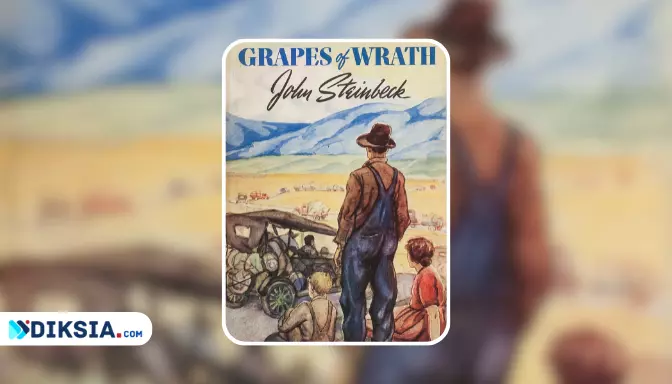Plot Summary
The following is a brief summary of the main events that happen in each chapter of the novel:
Chapter 1
The novel opens with a description of the Dust Bowl in Oklahoma, where the crops are destroyed by drought and dust storms, and the farmers are desperate and hopeless.
Chapter 2
Tom Joad hitchhikes a ride with a truck driver who is curious about his past. Tom reveals that he has just been released from prison after serving four years for killing a man in self-defense.
Chapter 3
A turtle crosses the road, symbolizing the struggle and resilience of nature and life. Tom picks up the turtle and puts it in his coat.
Chapter 4
Tom meets Jim Casy, a former preacher who has given up preaching because he no longer believes in sin or grace. Casy tells Tom that he has been wandering around, trying to find his purpose in life. They decide to go together to Tom’s family farm.
Chapter 5
A bank agent arrives at a farm to evict the tenants who have failed to pay their mortgages. He tells them that they have to leave because the land belongs to the bank, which is controlled by larger interests. The tenants are angry and helpless, and some threaten to resist or fight back.
Chapter 6
Tom and Casy reach Tom’s family farm, only to find it deserted and ruined. They meet Muley Graves, an old neighbor who has refused to leave his land. Muley tells them that Tom’s family has been evicted and has gone to stay with his uncle John nearby. He also tells them that many families have left for California, where there are supposed to be jobs and opportunities.
Chapter 7
A car salesman sells used cars and trucks to the migrants who want to go to California. He uses various tricks and lies to cheat them and make more money.
Chapter 8
Tom and Casy join Tom’s family at his uncle John’s farm, where they are preparing to leave for California. They meet Tom’s parents (Pa and Ma), his grandparents (Grampa and Granma), his siblings (Noah, Al, Rose of Sharon, Ruthie, Winfield), his brother-in-law (Connie), and his uncle (Uncle John). They load their truck with their belongings and their animals. Grampa refuses to go, but they drug him with soothing syrup and take him along.
Chapter 9
The migrants sell or burn their possessions that they cannot take with them. They feel sad and bitter about leaving their homes and memories behind.
Chapter 10
The Joads leave for California with their truck, which is old and overloaded. They join a highway full of other migrants like them. They stop at a gas station, where they are treated rudely by the owner who dislikes Okies.
Chapter 11
The deserted farms are vandalized by tractors that plow through them, destroying everything in their path. The houses are left empty and decaying, haunted by the ghosts of the past.
Chapter 12
The migrants travel westward along Route 66, which is described as “the mother road” that connects them to their destination. They face many hardships such as heat, dust, hunger, thirst, and fatigue. They also encounter kindness from other travelers who share their food or help them fix their cars.
Chapter 13
The Joads stop at a roadside camp where they meet Ivy and Sairy Wilson, a couple from Kansas whose car has broken down. They help each other by sharing their tents and their food. Grampa becomes ill and dies at the camp. The Wilsons agree to join the Joads on their journey.
Chapter 14
The narrator reflects on how the migrants are changing from individual families to a collective group of people who share a common experience and a common goal. He argues that this change is necessary for their survival and their resistance against the forces that oppress them.
Chapter 15
The narrator describes the contrast between the roadside restaurants and the migrants who stop there. The restaurant owners and workers are suspicious and contemptuous of the migrants, who are hungry and poor. However, some of them also feel pity and sympathy for them, and sometimes give them food or candy.
Chapter 16
The Joads and the Wilsons continue their journey along Route 66. They cross the border into New Mexico, where they meet a man who tells them that there is no work in California, and that the handbills advertising jobs are lies.
He also tells them that the Californians hate the Okies and treat them badly. The Joads are worried but they decide to keep going. They reach the border of Arizona, where they are inspected by a border guard who lets them pass.
Chapter 17
The narrator describes how the migrants form camps along the road, where they create a sense of community and order. They establish rules and norms to regulate their behavior and to protect themselves from trouble. They also have fun and entertainment by singing, dancing, telling stories, and playing games.
Chapter 18
The Joads and the Wilsons cross the desert at night, hoping to avoid the heat and the police. Sairy Wilson is sick and cannot go on, so they decide to stay behind with her husband. The Joads give them some money and promise to pray for them.
The Joads make it across the desert and reach the border of California, where they are stopped by a hostile inspection officer who insults them and searches their car.
They enter California and camp at a river, where they meet a ragged man who tells them that his son died of starvation in California, and that there is no work or hope there. He warns them to turn back before it is too late.
Chapter 19
The narrator gives a historical account of how California was taken over by white settlers who drove away the Native Americans and the Mexicans from their land. He explains how the landowners became rich and powerful by exploiting the land and the workers, and how they tried to preserve their wealth and status by controlling the laws and the police.
He contrasts their greed and wastefulness with the needs and desires of the migrants, who only want a little piece of land to live and work on.
Chapter 20
The Joads leave the river camp and drive towards a town called Bakersfield, where they hope to find work. They stop at a Hooverville, a shanty town where many migrants live in squalid conditions. They meet Floyd Knowles, a young man who tells them that there is no work in the area, and that the handbills are fake.
He says that the contractors use them to lure more workers than they need, so that they can lower the wages and break up strikes. A contractor arrives at the camp with a deputy sheriff, offering work at a peach orchard. Floyd asks to see his license and his wage rate, but the contractor refuses to show them.
The deputy tries to arrest Floyd on a false charge, but Floyd punches him and runs away. Tom trips the deputy and Casy knocks him out with a pick handle. Casy tells Tom to hide in the camp and takes the blame for the fight. He is taken away by another deputy who arrives with reinforcements.
Chapter 21
The narrator describes how the migrants are hated and feared by the Californians, who see them as a threat to their way of life. He shows how the Californians use various methods to keep them down, such as spreading lies about them, burning their camps, paying low wages, charging high prices, and denying them education and health care.
He also shows how some of the migrants start to fight back, organizing unions, going on strikes, and demanding their rights.
Chapter 22
Tom sneaks out of the Hooverville with his family after dark. They drive away from Bakersfield and look for another place to stay. They come across Weedpatch Camp, a government camp that is run by a committee of migrants.
They are welcomed by Mr. Thomas, the camp manager, who tells them that there is no work at the moment, but there might be some cotton picking soon. He also tells them that they have to follow some rules in order to stay in the camp, such as keeping it clean, respecting others, and participating in camp activities.
The Joads are impressed by the facilities and the services of the camp, such as the toilets, the showers, the kitchen, the library, the nursery, and the entertainment hall. They feel safe and comfortable in the camp, where they are treated with dignity and respect.
Chapter 23
The narrator describes how the migrants cope with their misery and boredom by creating music and art. He shows how they use various instruments, such as guitars, harmonicas, fiddles, and spoons, to play songs that express their emotions and their stories. He also shows how they use other forms of art, such as storytelling, dancing, painting, and carving, to enrich their lives and their culture.
Chapter 24
The Joads settle in Weedpatch Camp, where they make friends with other migrants and participate in camp activities. They attend a dance at the entertainment hall, where they have fun and relax.
However, they also face some trouble from a group of intruders who are sent by the Farmers’ Association, a group of landowners who are opposed to the government camps. The intruders try to start a fight in order to give an excuse for the police to raid the camp, but they are foiled by the camp guards and the camp committee.
Chapter 25
The narrator describes how the land of California produces abundant and beautiful crops, but also how these crops are wasted and destroyed by the landowners who control the market and the prices.
He shows how the landowners use various methods to prevent the crops from reaching the people who need them, such as dumping them into rivers, burning them, spraying them with poison, or letting them rot. He also shows how this waste and destruction leads to hunger and death among the migrants and the poor.
Chapter 26
The Joads leave Weedpatch Camp after staying there for a month, because they need to find work in order to buy food and clothes. They drive around looking for work, but they find that most places are overcrowded with workers or offer very low wages.
They finally find work at a peach orchard, where they are paid five cents per box of peaches. They do not know that this orchard is the site of a strike led by Casy and his followers, who are protesting against a wage cut. They also do not know that they are scabs, workers who replace strikers.
They enter the orchard through a guarded gate, where they are given tents to live in. They feel uneasy about the situation, but they decide to take the work anyway because they are desperate.
Chapter 27
The narrator describes how the migrants pick cotton as their last chance to make some money before winter. He shows how they work hard and fast, trying to fill as many sacks as possible.
He also shows how they compete with each other for work, and how they suffer from injuries and infections caused by the cotton bolls. He also shows how some of them manage to save some money or buy some luxuries, such as candy or tobacco.
Chapter 28
Tom sneaks out of the peach orchard at night to look for Casy and his strikers. He finds them hiding in a stream bed near the orchard. He talks to Casy, who tells him that he has been organizing workers to demand fair wages and conditions.
He also tells him that he has been inspired by Tom’s words about being part of something bigger than himself. He says that he has realized that all people are holy and that they have a spirit that connects them to each other and to God.
He says that he is willing to die for this cause if necessary. As they are talking, they are attacked by a group of men who have been sent by the landowners to break up the strike.
One of them hits Casy with a pick handle on his head, killing him. Tom grabs the pick handle and hits the man back on his face, killing him. He escapes back to his family’s tent with a deep cut on his cheek.
Chapter 29
The narrator describes how a heavy rain falls on California, causing floods and mudslides that ruin the crops and damage the roads and bridges. He shows how this rain affects the migrants, who have nowhere to go or stay.
He shows how some of them drown or die of pneumonia or starvation. He also shows how some of them lose hope or go crazy or turn violent. He also shows how some of them cling to their faith or their dreams or their love for each other.
Chapter 30
The Joads leave the peach orchard after finding out that they have been scabs and that Tom has killed a man. They drive away from the area and look for another place to work. They find a cotton field, where they are hired to pick cotton. They are given a boxcar to live in, which they share with another family, the Wainwrights.
There, Rose of Sharon goes into labor and gives birth to a stillborn baby, which they bury in the mud. Tom tells his family that he has to leave them because he is wanted by the police and he does not want to endanger them. He says that he will continue Casy’s work of fighting for justice and freedom.
He says that he will be with them wherever they go, in their hearts and minds. He leaves his family with a promise to write to them if he can. The family moves on to a new camp, where they are told that the water is rising and they have to leave soon.
They try to drive away, but their car breaks down and they are stuck in the flood. They find shelter in a barn, where they find a starving man and his son. Rose of Sharon offers to breastfeed the man with her milk, showing an act of compassion and humanity in the midst of despair and hopelessness.






